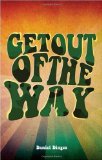The individual experiences of soldiers during the Vietnam War are the basis of some excellent books, whether the nonfiction combat memoir, combat experiences as the basis for fiction or the recollections of soldiers who deserted and went to Canada. With his novel Get Out of the Way, Daniel Dinges presents a different perspective, that of a young man trying to use the draft to avoid Vietnam. Yet an untraditional perspective alone can’t ensure success with readers.
 Although he’s been relying on student deferments, Tom Daniels, the novel’s protagonist, learns there are 20 support personnel, 10 stateside, for every combat soldier in Vietnam. He also discovers most of the draftees in combat are 18 and with no more than a high school diploma while he is about to turn 21 and has two years of college. He decides that those factors, his wits and good fortune may be enough to avoid carrying a rifle in Vietnam. In December 1967 he gives up his deferment and we follow him as he pursues that goal at the same time troop strength in Vietnam is climbing toward its peak.
Although he’s been relying on student deferments, Tom Daniels, the novel’s protagonist, learns there are 20 support personnel, 10 stateside, for every combat soldier in Vietnam. He also discovers most of the draftees in combat are 18 and with no more than a high school diploma while he is about to turn 21 and has two years of college. He decides that those factors, his wits and good fortune may be enough to avoid carrying a rifle in Vietnam. In December 1967 he gives up his deferment and we follow him as he pursues that goal at the same time troop strength in Vietnam is climbing toward its peak.
One of the biggest problems, whether intended or not, is that the book seems to reflect what one might imagine to be the languor of the stateside military base, especially for someone assigned to support duty. This isn’t because we demand the danger or uncertainty of a combat zone or that we are comparing the story to those set in a combat zone. It’s because there actually isn’t a lot to engross us, whether in basic training, on military assignment or in the details of Daniels’ life prior to the military. The result is a pallid feel that is exacerbated by a seemingly flat and detached tone. At times, Get Out of the Way has the resonance of a vanity press-quality memoir cast in the guise of a novel.
The book may actually contain the best explanation of what gives rise to this. At one point Daniels is explaining to someone why he prefers the computer programming to which he’s been assigned over his efforts at songwriting when he was a performing musician. “I think it’s the difference between dealing with emotions and texture instead of facts,” he says. Get Out of the Way likewise seems to better portray and describe places, things and processes than people or emotions. It’s not that Dinges writes poorly. His prose is straightforward and he isn’t one of those debut novelists whose thesaurus is about to fall apart from overuse. It’s more a lack of vitality combined with secondary characters who just don’t seem fleshed out enough to feel real.
Dinges deserves credit for taking an uncommon approach toward a Vietnam War story, one often forgotten unless it shows up in the news or nonfiction works about those from upper income families who had the National Guard or other mechanisms to avoid the draft. Unfortunately, there just isn’t enough texture to the concept on paper to make Get Out of the Way a notable addition to the canon of Vietnam-related literature.
It was a time when remaining true to yourself, your country, and standing up for your most strongly held beliefs had become almost impossible.
Daniel Dinges, Get Out of the Way







